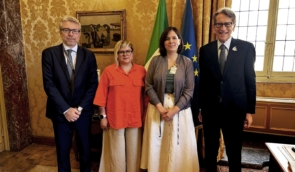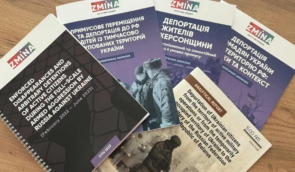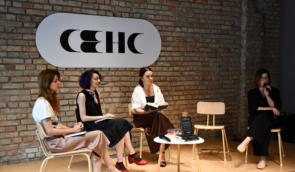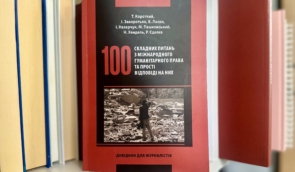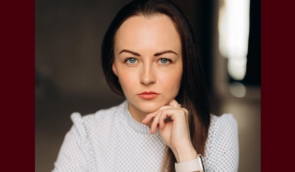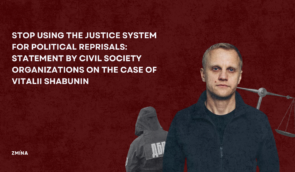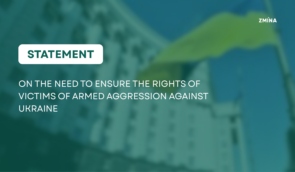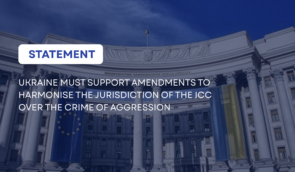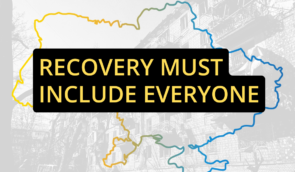Human rights in Crimea: a roundtable with PACE delegates took place
On January, 20th, 2021, ahead of the winter session of the Parliamentary Assembly of Council of Europe (PACE), a roundtable on the topic of human rights in occupied Crimea took place, with participation of PACE delegates, Representative of President of Ukraine in Crimea and human rights defenders.
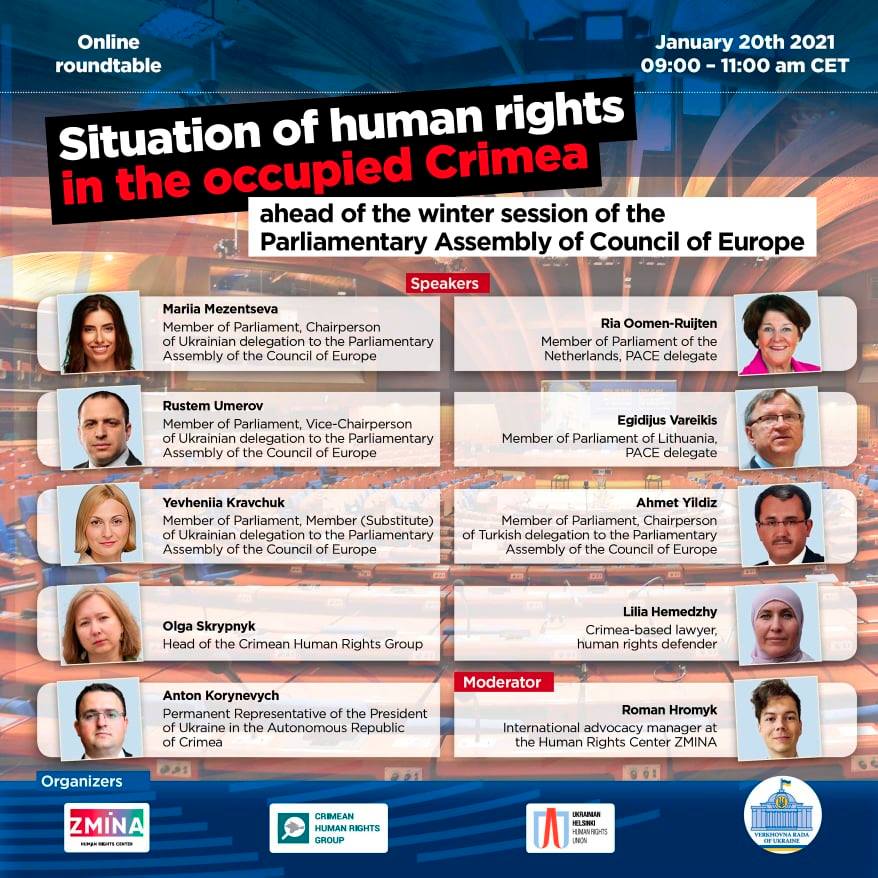
According to ZMINA’s international advocacy manager Roman Hromyk, the winter session of PACE begins on January, 25th and it will be the first time that MPs from the countries-members of the Council of Europe are meeting in Strasbourg for a full scale session since the Covid-19-related restrictions were introduced and are going to discuss, among other topics, the issue of Crimea.
During 2020 the situation of human rights in the peninsula has worsened – according to the participants of the roundtable. Numerous searches, persecution and arrests of dissidents, militarization of the population, destruction of Ukrainian identity, rapid shrinking of the water resources of the peninsula as well as many other factors threaten the rights of Crimeans and go against the norms of international law. Furthermore, the global COVID-19 pandemic became an additional threat, since the peninsula residents were caught unprotected due to inefficient actions of the occupant government as well as due to the lack of an efficient policy on this matter.
Olga Skrypnyk, the head of the Crimean Human Rights Group, informed the audience that since 2019, when the release of a number of political prisoners happened, there were no new releases in 2020. Russia actively uses its anti-terrorism legislation as an instrument of political persecution of local activists, journalists and human rights defenders. This way the occupants threw 9 muslims behind the bars for alleged relation to a terrorist organization and promotion of related ideology.
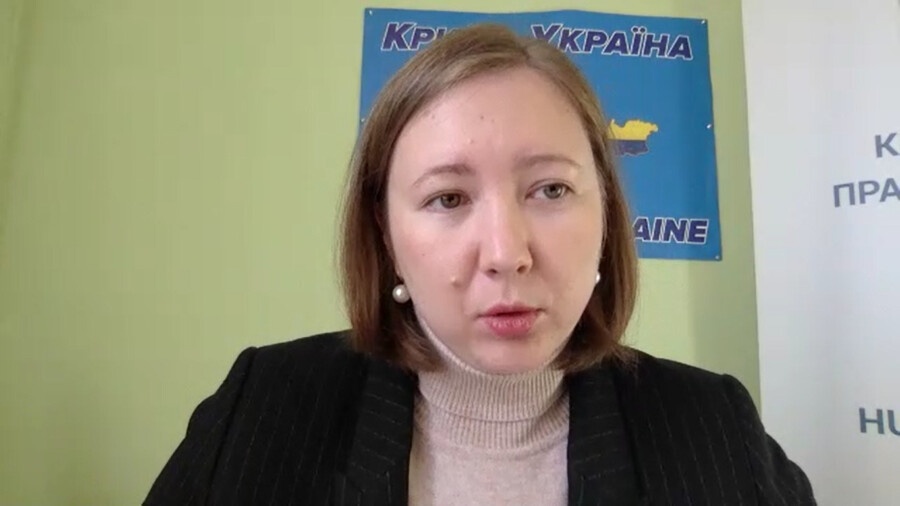 Olga Skrypnyk
Olga SkrypnykAnother dangerous tendency is the militarization of the civilian population. Russia runs military campaigns and promotes serving in the Russian Army. “Almost 28 thousands of Ukrainians were drafted by the Russian Army, avoiding the draft is punishable and many young Ukrainians were drafted by force” – said Skrypnyk while adding that Crimean Human Rights Group has documented 163 criminal cases, opened for avoiding the draft to occupant’s army.
Moreover, the militarization is applied to children too. Russia offers children to participate in military drills and creates a positive image for serving in the army. Ministry of defense of the Russian Federation even produced an order with a program of patriotic education. Olga Skrypnyk underlined that as of today, 200 thousands of Crimean children are constantly submerged by the system of educational militarization.
Anton Korynevych, the Permanent Representative of the President of Ukraine in Crimea, added that the forced draft to the occupant army goes on even during the pandemic and constitutes a war crime according to the definitions of international humanitarian and criminal law.
Forced relocation of Russian citizens to Crimea, performed by Russia, also constitutes a violation of international law and aims at changing the demographic composition of the peninsula – Korynevych comments. Such relocation is a threat to the residents with pro-Ukrainian views, who are forced to leave the peninsula out of fear of persecution.
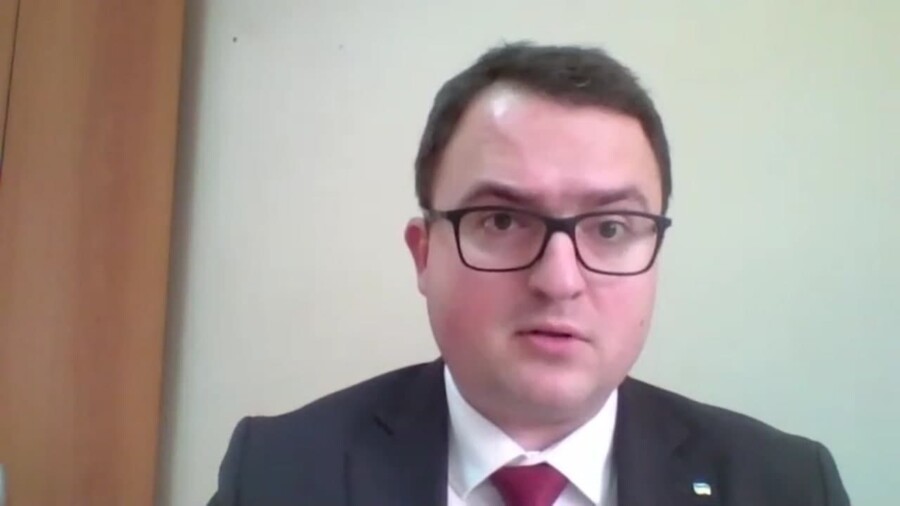 Anton Korynevych
Anton KorynevychCrimean lawyer and human rights defender Lilia Hemedzhy pointed out the topic of health of the political prisoners and underlined that Russia continues to deny political prisoners – citizens of Ukraine access to medical care.
Hemedzhy adds that the mothers and wives of the detainees are themselves being persecuted and arrested for holding solo manifestations in support of their men. While the children of political prisoners are in need of psychologists and other therapists.
The human rights defender stressed that the political prisoners and their families need public support. That is why it is important to keep track of the trials, attend court hearings, write letters – make their stories known and apply pressure on the occupant administration.
Pandemic is a separate issue, as it is being used against Ukrainian citizens in Crimea by the Russian government. Member of Parliament of Ukraine, Deputy-Head of the Permanent Delegation of Ukraine to PACE Rustem Umerov is concerned about the forced vaccination of Crimeans who are employed by educational institutions or healthcare providers.
“If these individuals refuse to be vaccinated, they get fired. The Russian vaccine did not pass all the necessary stages of clinical testing, hence it is difficult to predict the outcome of such vaccination”, – he said.
The politician also pointed out that the occupant administration is hiding the real numbers of infected and the overall nature of the pandemic. According to him, there is not enough room in the hospitals of Crimea. Hospitals and doctors deny hospitalization to the ill, on certain occasions people have to wait for more than 24 hours for the ambulance to arrive.
On a separate note, he added that Ukrainian government will continue being in close contact with the representatives of international and non-governmental organizations and will keep updating information on the occupation of Crimea at PACE.
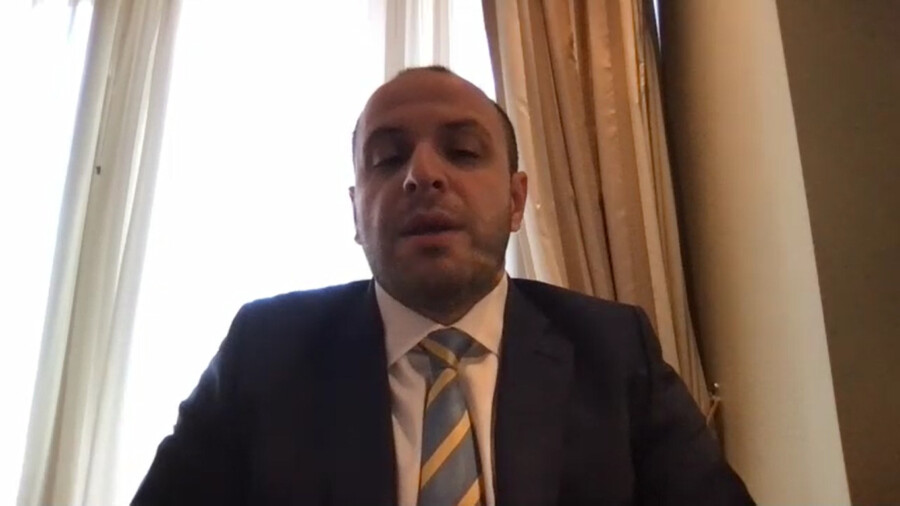 Rustem Umerov
Rustem UmerovYevheniia Kravchuk, a Member of Parliament of Ukraine and a member of the Permanent Delegation of Ukraine to PACE said that the parliamentary assembly is a powerful tool of democracy and its voice is taken to account by bodies such as the European Court of Human Rights or Council of Europe’s Venice Commission. Kravchuk also pointed out that despite Russia’s attempts to apply pressure on PACE delegates, the parliamentarians do not accept occupation of Crimea and Ukraine is successful on the international arena.
Member of the Delegation of Lithuania to PACE Egidijus Vereikis noted that PACE delegate keep an eye on the situation of Ukraine and understand very well what really happens in Crimea. He recommended representatives of Ukraine to have have a well-articulated stance, to speak out as one powerful team on international platforms and to have more friends among other countries for a stronger support. He also promised not to forget about Ukraine’s issues.
Ahmet Yildiz, the Head of Turkish delegation to PACE, stressed that their stance on Crimea remains unchanged: “We support territorial integrity of Ukraine and do not recognize Russia’s annexation of Crimea. We will continue to cooperate with Ukraine in PACE and to advocate for rights of Crimean Tatars”.
Ria Oomen-Ruijten, the Dutch senator and PACE delegate also supported these theses while adding that assembly representatives identify Russia’s illegal actions in Crimea as a violation of international law and that they will keep track of the situation in the peninsula.
Furthermore, Mariia Mezentseva, Member of Parliament of Ukraine, Chairperson of Ukrainian delegation to the Parliamentary Assembly of the Council of Europe, told that because of the numerous violations of human rights in Crimea, the new strategy of Ukrainian delegation will envision creation of an informal Crimean platform at the parliamentary assembly for a consistent support of Crimeans.
The online discussion can be viewed here in Ukrainian and in English.
The event was organized by Human Rights Center ZMINA, Crimean Human Rights Group, Ukrainian Helsinki Human Rights Union together with the Ukrainian delegation to the Parliamentary Assembly of the Council of Europe.
If you have found a spelling error, please, notify us by selecting that text and pressing Ctrl+Enter.

